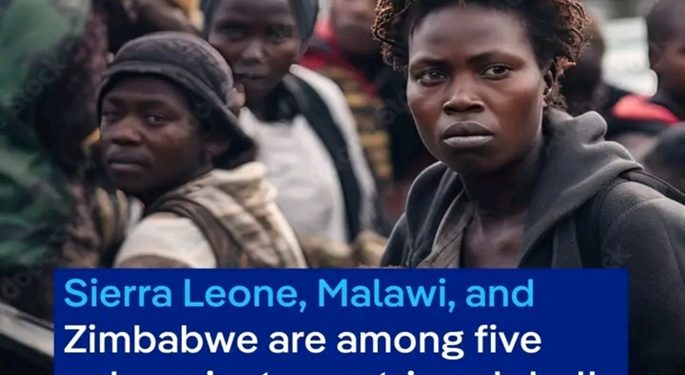By Hassan Osman Kargbo
The recent global happiness rankings have placed Sierra Leone among the lower half of nations, prompting intense discussions within the country about the true meaning of happiness.
Reverend Father Peteh Konteh, Executive Director of Caritas Freetown, has weighed in on the debate, questioning the methodology behind these rankings and urging a broader understanding of happiness beyond material wealth.
The report, which surveyed the well-being of nations and ranked them based on various indicators such as economic stability, life expectancy, social support, and perceptions of corruption, ranked Sierra Leone lower than many expected, leading to heated conversations within the country, as citizens take issue with how their national happiness is measured and portrayed on the global stage.
Fr. Konteh, a prominent religious leader and advocate for the marginalized, was among the first to offer a critical perspective on the ranking. In an interview, he raised an essential question: “Are we confusing prosperity with happiness?” He noted that while economic prosperity is often seen as a measure of a country’s well-being, it fails to capture the complex emotional and cultural elements that contribute to true happiness.
According to Fr. Konteh, the tendency to equate wealth with happiness overlooks the simple joys that many Sierra Leoneans find in their lives, despite economic hardships. “There are people in our country who live with very little material wealth, yet they find contentment in family, faith, and community,” Fr. Konteh said. “Happiness is not about having more money or expensive things; it’s about finding fulfillment in the relationships and moments that truly matter.”
Fr. Konteh pointed to global statistics on suicide rates as an example of how wealth does not guarantee happiness. He noted that many developed nations, where economic prosperity is high, report higher suicide rates compared to less affluent countries. “This stark contrast in suicide rates raises an important question: If wealth truly equates to happiness, why do we see so much dissatisfaction in developed nations?” Fr. Konteh asked. “Sierra Leone is not an unhappy country. We may face many challenges, but we are a resilient people who find joy in the simplest pleasures of life.”
The priest’s comments challenge the validity of the global happiness rankings and their reliance on material factors. He emphasized that despite the difficulties Sierra Leone faces, including economic deprivation and infrastructure challenges, the country is home to many people who continue to find joy in life. “Our happiness should not be measured solely by wealth. In fact, many billionaires live in a constant state of dissatisfaction despite their riches,” Fr. Konteh pointed out.
In his call for a rethinking of happiness, Fr. Konteh suggested that the cultural context of Sierra Leone must be taken into account. “Our culture, our sense of community, and our shared experiences contribute greatly to our happiness,” he said. “Sierra Leoneans find joy in togetherness, in celebrating life despite adversity, and in building connections with one another. This is the happiness we should celebrate.”
Father Konteh also urged Sierra Leoneans to focus on the positive aspects of their society, rather than solely on the challenges they face. “Yes, we need development and support, but let us not overlook the joy that exists in our communities,” he said. “There is a unique happiness that stems from our way of life, and that is something to be proud of.”
Sierra Leone’s debate over its happiness ranking highlights the need for a broader understanding of what constitutes a nation’s well-being. While material factors such as economic stability and infrastructure are important, they do not encompass the full range of human emotions and experiences that contribute to happiness. As Fr. Konteh wisely pointed out, happiness is not solely about wealth—it’s about finding meaning, fulfillment, and contentment in life’s simple pleasures.
The ongoing discussion about Sierra Leone’s happiness ranking is an important reminder that happiness is subjective and influenced by a range of personal and cultural factors. It invites Sierra Leoneans to reflect on what truly makes them happy and to celebrate the unique qualities of their society that contribute to a deep sense of joy and resilience.













